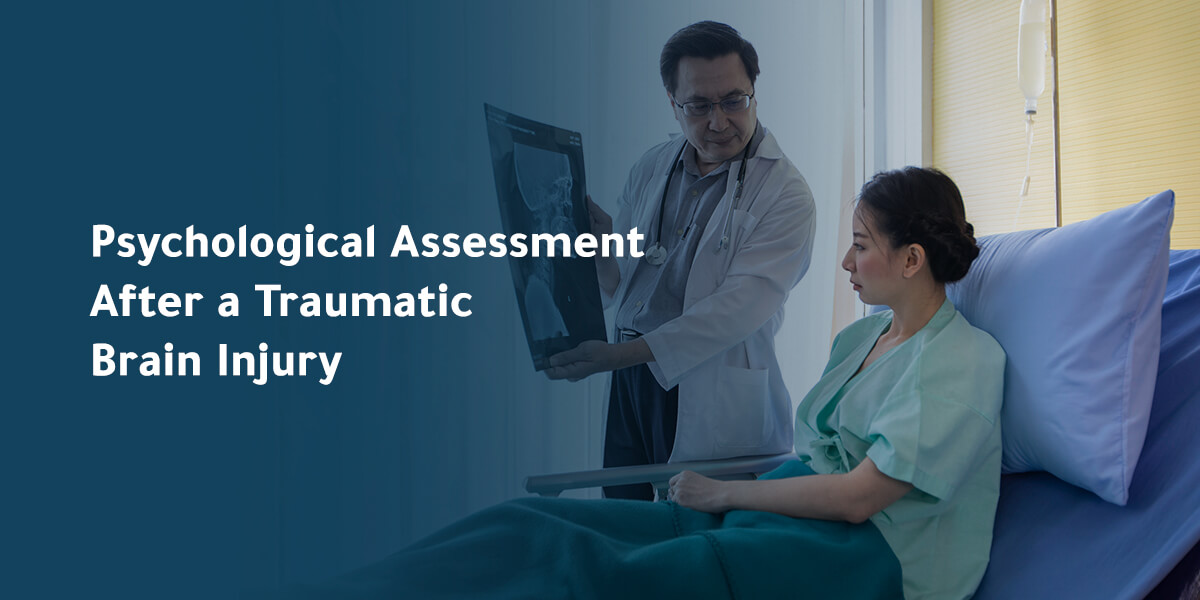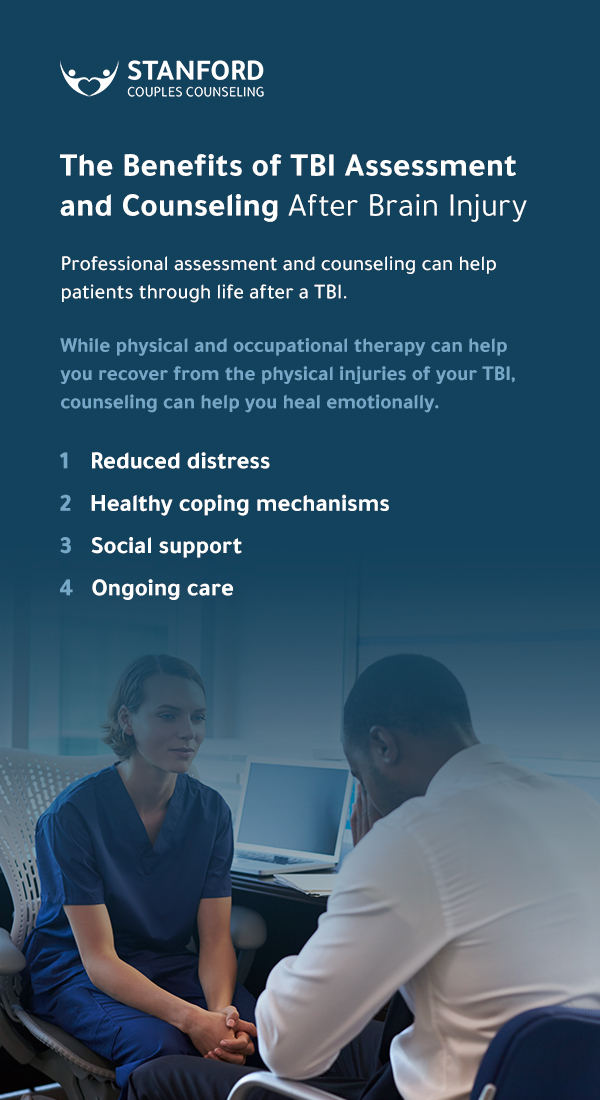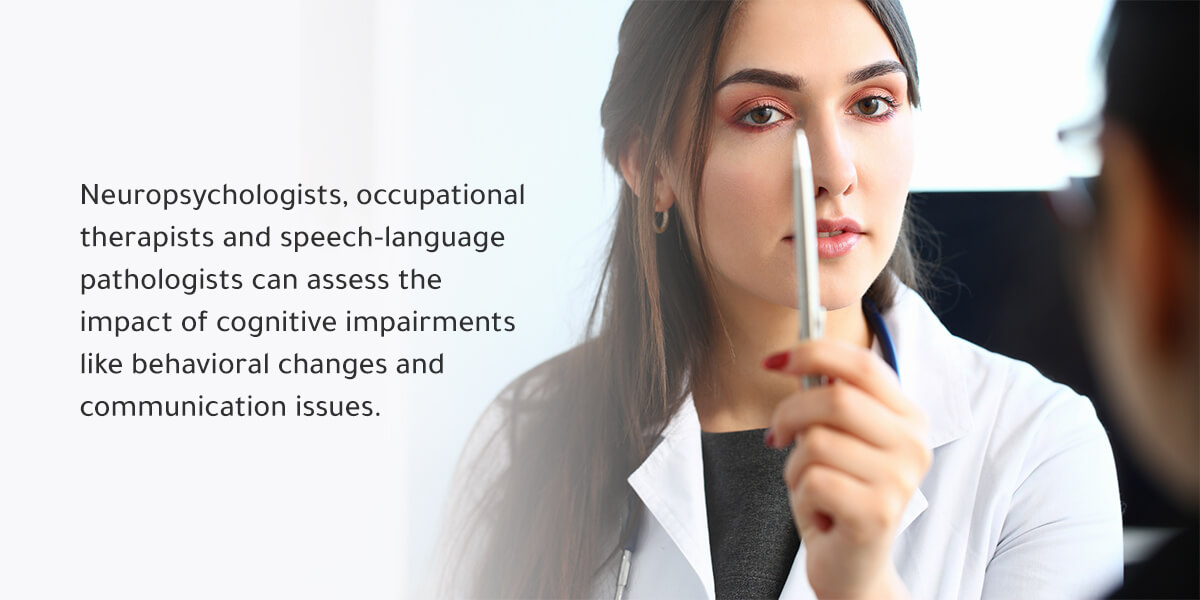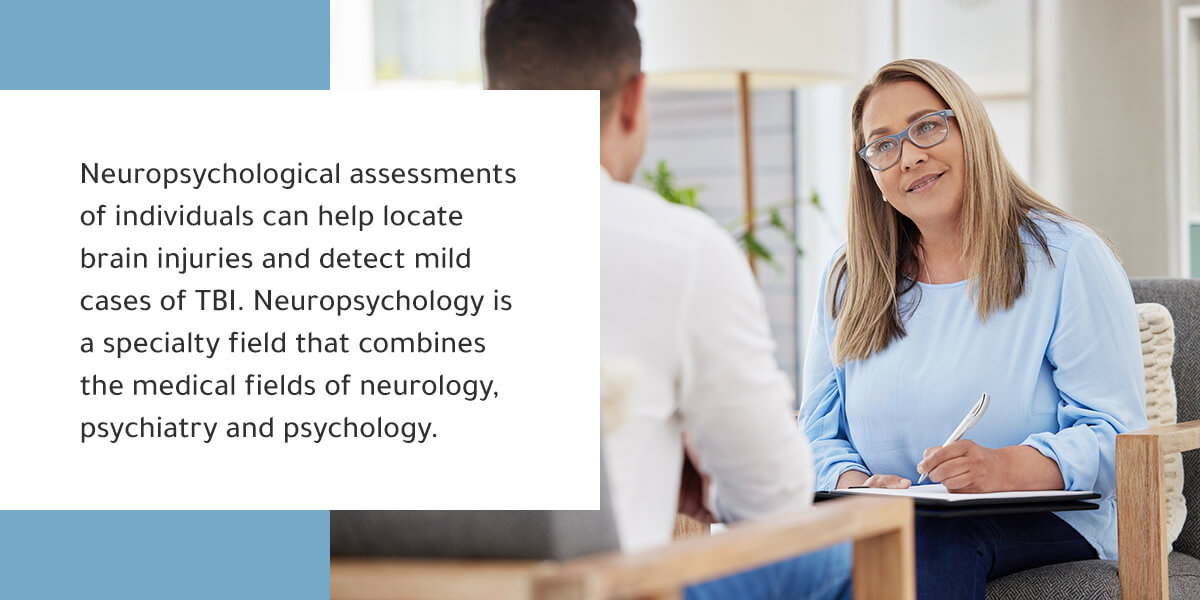A traumatic brain injury (TBI) causes changes in how the brain works. A severe jolt, bump or blow to the head often results in various physical and psychological symptoms and can be fatal if left untreated. In 2020, over 64,000 TBI-related deaths occurred in the United States.
Undergoing a psychological assessment is essential for individuals suspected of having a TBI. Professionals can test a person’s cognitive capabilities and devise a treatment plan to help with symptoms and functionality.
The Benefits of TBI Assessment and Counseling After Brain Injury
Professional assessment and counseling can help patients through life after a TBI. Many people who experience brain injury also deal with depression and anxiety. A brain injury can also cause disruptions to your relationships, work or school.
While physical and occupational therapy can help you recover from the physical injuries of your TBI, counseling can help you heal emotionally.
While everyone’s experience in therapy will differ, the primary benefits of TBI assessment and counseling include:
- Reduced distress: By discussing and working through any uncomfortable emotions with a professional, counseling can help you find solutions to specific problems and lead to improvements in your school life, work or relationships. As a result, therapy may help you feel happier in the present and more hopeful about the future.
- Healthy coping mechanisms: Counselors can help you develop new skills and coping techniques for particularly stressful times. You might learn to replace maladaptive coping mechanisms with healthy hobbies and activities that make you feel better. For example, you might try music therapy, art, hiking or other types of hobbies to help manage stress or depression resulting from a TBI.
- Social support: While some people may have friends and community support in times of need, others are less fortunate. A trained counselor can provide the support needed to navigate life with a TBI. Counselors can also help improve the social aspects of your life after a brain injury.
- Ongoing care: A brain injury can often require lifelong care. A counselor can help you discover your particular problems and address your concerns so you can overcome future challenges on your own. You’ll work on these challenges during sessions and at home so you’re better equipped to care for yourself long-term.
What Is a Neuropsychological Test?
Cognitive dysfunction is a primary symptom of TBI. An individual suffering from cognitive failure will find it challenging to plan, concentrate, remember things clearly, solve problems and make decisions.
Mild traumatic brain injury is often the most challenging to diagnose and can go unchecked when individuals don’t realize they’ve been affected. For example, a football player might not realize the social or cognitive dysfunction they’re experiencing due to a head injury. It’s also often difficult for an injured individual to remember the exact details of their injury.
Fortunately, neuropsychological assessments of individuals can help locate brain injuries and detect mild cases of TBI. Neuropsychology is a specialty field that combines the medical fields of neurology, psychiatry and psychology. It involves determining how well the brain works when it’s affected by a brain injury. Assessments can test a wide range of mental functions.
Neuropsychological assessments aren’t like taking a multiple-choice test — there’s no pass or fail. Physicians can administer professional tests to work out a diagnosis and develop a helpful treatment approach depending on your needs.
The following are different types of neuropsychological tests and the evaluation process for diagnosing a TBI:
Halstead-Reitan Neuropsychological Battery (HRNB)
The HRNB combines eight tests to evaluate one’s brain functioning and nervous system issues and identify the exact location of the brain damage. The tests in this group include:
- Wechsler Intelligence Scale: This test determines the impact of a brain injury by measuring intellectual ability.
- Aphasia Screening Test: The Aphasia Screening Test includes a variety of short screening measures to address language disorders related to aphasia in people with TBI.
- Trail Making Tests: Trail Making Tests provide a clear picture of someone’s visual attention and ability to task switch. The two-part test involves connecting 25 dots as quickly and accurately as possible.
- Halstead Category Tests: This test involves seven subtests, including the Tactual Performance Test, Speech Sounds Perception Test, Sensory Perceptual Examination, Seashore Rhythm Test, Finger Tapping Test and Lateral Dominance Examination Test. These assessments can determine the brain injury’s severity and the damage’s exact location — the brain’s right or left hemisphere.
Delis-Kaplan Executive Function System (D-KEFS)
The D-KEFS comprises nine subtests to assess children’s and adults’ non-verbal and verbal functioning. The different tests measure damage to the frontal lobes, including tests that evaluate executive functions such as:
- Inhibition
- Flexibility in thinking
- Planning
- Creativity
- Problem-solving
- Abstract thinking
- Verbal and spatial impulse control
- Concept formation
This nationally standardized assessment can be used for adults and children ages 8 to 89.
How Does a Neuropsychological Evaluation Work?
A person suspected of having a traumatic brain injury will need to undergo a comprehensive neuropsychological evaluation to diagnose and treat this condition. Neuropsychologists, occupational therapists and speech-language pathologists can assess the impact of cognitive impairments like behavioral changes and communication issues.
Professionals will evaluate a person’s cognitive capabilities, such as thinking, motor function, sensory function, coordination, eye movement and reflexes, whether you have a mild traumatic brain injury or a moderate to severe TBI.
The neuropsychological evaluation process consists of the following steps:
- Background review: If you have TBI symptoms that are worsening or persisting, the first step of evaluation involves reviewing your background. For example, you may have previous concussions, depression, sleep disturbances or medications that slow recovery or mimic concussion symptoms.
- Evaluation: A neuropsychologist can then conduct a neuropsychological assessment to assess your attention, memory, reasoning and other critical cognitive skills. Neuropsychologists can use personality and mood assessments to determine whether psychological factors are at play. Results of this evaluation can identify present cognitive impairments and the abilities most affected by a TBI.
- Repeat testing: Neuropsychologists can administer frequent testing over time to document improvements and adjust treatment methods accordingly.
Individuals with moderate or severe TBI symptoms should seek medical care as soon as possible. Healthcare providers can stabilize the individual and help prevent further injury. This process includes:
- Cardiac and pulmonary function assessment: A cardiopulmonary evaluation refers to a wide range of tests used to monitor heart and lung functioning in the event of a TBI. Depending on the severity of the TBI, it can be essential to check respiratory function through exercise or other methods.
- Physical examination: An overall body exam can detect and treat any associated external injuries.
- Neurological examination: For the neurological assessment, physicians will usually administer a Glasgow Coma Scale (GCS) test, a pupil test or brainstem reflex testing, including gag and corneal (blink). The pupil test will determine the ability of the pupils to become smaller in bright light. Those with mass lesions in the brain or high intracranial pressure (ICP) frequently experience widened pupils. The GCS test will assess patients based on three types of responsiveness — eye-opening, motor and verbal responses.
In addition to these assessments, patients can be tested through radiological evaluation. A computed tomography (CT or CAT) scan is typically used to detect blood and fractures — the most crucial lesions in medical trauma cases. X-rays can also help evaluate mild neurological dysfunction, though CT scanning tends to be more accurate.
Magnetic resonance imaging (MRI) can help determine a prognosis rather than influence treatment options, as it tends to take longer to perform compared to a CT. However, once a patient is stabilized, an MRI may show lesions that go undetected on a CT scan. While CT and MRI scans might not detect all TBIs, they can help physicians rule out other serious brain injuries.
Symptoms and Signs of a Traumatic Brain Injury
Learn the signs of a mild, moderate or severe traumatic brain injury, how a neuropsychological evaluation works, recovery options and the benefits of therapy after a TBI. Sometimes, it can be challenging to know whether you have suffered a traumatic brain injury. While some mild symptoms may appear immediately, others may not appear for hours or days after sustaining the damage.
The Centers for Disease Control and Prevention (CDC) lists three main types of traumatic brain injury — mild, moderate or severe. These symptoms will vary in severity and can change over time depending on the person.
Symptoms of Mild TBI
A mild traumatic brain injury or concussion’s symptoms can affect how you feel, think, act or sleep. Generally, most symptoms will improve over time. Those with a mild brain injury will feel better within a couple of weeks.
The physical and sensory symptoms of a mild TBI or concussion include:
- Dizziness or loss of balance
- Headache
- Nausea or vomiting
- Problems with speech
- Fatigue or drowsiness
- Blurred vision
- Sensitivity to light or sound
- Changes in the ability to smell
- Ringing in the ears
- A bland taste in the mouth
Further, you may experience the following cognitive, behavioral or mental symptoms when you have a mild TBI:
- Memory or concentration problems
- Trouble thinking clearly
- Sleeping more than usual
- Mood changes or mood swings and irritability
- Difficulty sleeping or oversleeping
- Feeling depressed or anxious
- Loss of consciousness for a few seconds to a few minutes
- Disorientation or confusion
These symptoms can differ depending on the person and may evolve throughout recovery. For instance, you may struggle with headaches and feel sick early on. Then, you might become more emotional than usual within a week or two or have difficulty sleeping.
Symptoms of Moderate to Severe TBI
A moderate to severe traumatic brain injury can include any of the signs and symptoms of mild injury. This condition may also exhibit the following symptoms within the first hours to days after a head injury:
Physical symptoms:
- Loss of consciousness from several minutes to hours
- Persistent or worsening headache
- Convulsions or seizures
- Dilation of one or both pupils of the eyes
- Inability to awaken from sleep
- Vomiting or nausea
- Weakness or numbness in the body
- Clear fluids draining from the nose or ears
- Loss of coordination
Cognitive or mental symptoms:
- Extreme confusion
- Agitation, aggression or other unusual behavior
- Slurred speech
- Coma and other consciousness disorders
Danger Signs of TBI
The terms “mild,” “moderate” and “severe” are used to describe the effect of the injury on brain function. Still, a mild injury can present severe problems and require immediate attention and an accurate diagnosis. In rare cases, a TBI can result in the development of a dangerous blood clot in the brain.
It’s essential to seek emergency medical care if you notice any of these danger signs:
- A headache that worsens and won’t go away
- Weakness or decreased coordination
- Convulsions or seizures
- Numbness
- Excessive vomiting
- Slurred speech
- One of your pupils is larger than the other
- Inability to recognize people or places
- Confusion
- Restlessness
- Agitation
- Losing consciousness
- Extreme drowsiness or problems waking up
Recovery Options After Being Diagnosed With Traumatic Brain Injury
Recovery is necessary to treat traumatic brain injuries. It can provide the social and emotional support you need through recovery while improving your ability to function at home and in your community. Professionals can help you treat mental and physical problems associated with TBI and help you adapt to changes that occur throughout recovery.
Therapists can also help prevent complications of TBI, such as:
- Blood clots
- Bowel and bladder problems
- Pain
- A drop in blood pressure when you move around
- Muscle weakness and muscle spasm
- Breathing problems and pneumonia
- Pressure ulcers or bedsores
- Reproductive and sexual function problems
Rehabilitation employs the body’s natural healing abilities and the brain’s relearning processes so a person can recover quickly and efficiently. You’ll learn new ways of adapting to abilities permanently changed by brain injury and work on daily functioning skills.
Recovery options for traumatic brain injury include:
Comprehensive Day Treatment
Comprehensive day treatment is typically provided in rehab facilities or hospitals. These comprehensive, structured programs are often offered in a group setting during the day and allow the individual to return home at night. The programs will vary depending on your needs, though typically they’ll include physical, occupational and speech therapy, as well as psychological care and social support for traumatic brain injury.
Outpatient Therapy
Following the above forms of therapy, individuals with brain injuries may continue outpatient treatment to maintain or increase their chances of a successful recovery. Those with injuries that aren’t severe enough to require hospitalization may attend these programs to address other problem areas due to their brain injuries, such as mental health conditions.
Ongoing Care
The recovery process will depend on the severity of your brain damage and how well you respond to therapy. Some may return to the same functional ability level before TBI, while others will need lifetime care. Additionally, specific long-term effects of TBI can appear years later. Certain patients may be at a higher risk of Alzheimer’s disease, Parkinson’s disease and other neurological disorders.
After rehab, you’ll need to understand expected and rare symptoms, advice for self-care and safety and community support resources. Your therapy team will often give your primary care doctor all of the records and recommendations needed for you to receive appropriate care.
Assessment for Traumatic Brain Injury Available at Stanford Couples Counseling
A traumatic brain injury can result in several cognitive functional problems. The neuropsychological assessments of individuals can determine the best form of care to treat the problem. Therapists can work with you to improve your daily functioning and get your life back on track.
At Stanford Couples Counseling, our goal is to provide the best comprehensive care possible for your unique needs. Our highly-trained therapists offer neuropsychological assessments and holistic care in a comfortable, compassionate environment. We’ll work with you to design a treatment path to address your TBI and improve your cognitive functioning so you can get back to the activities you love the most.
To schedule an appointment at our Uptown or North Dallas locations, fill out our online form today.





